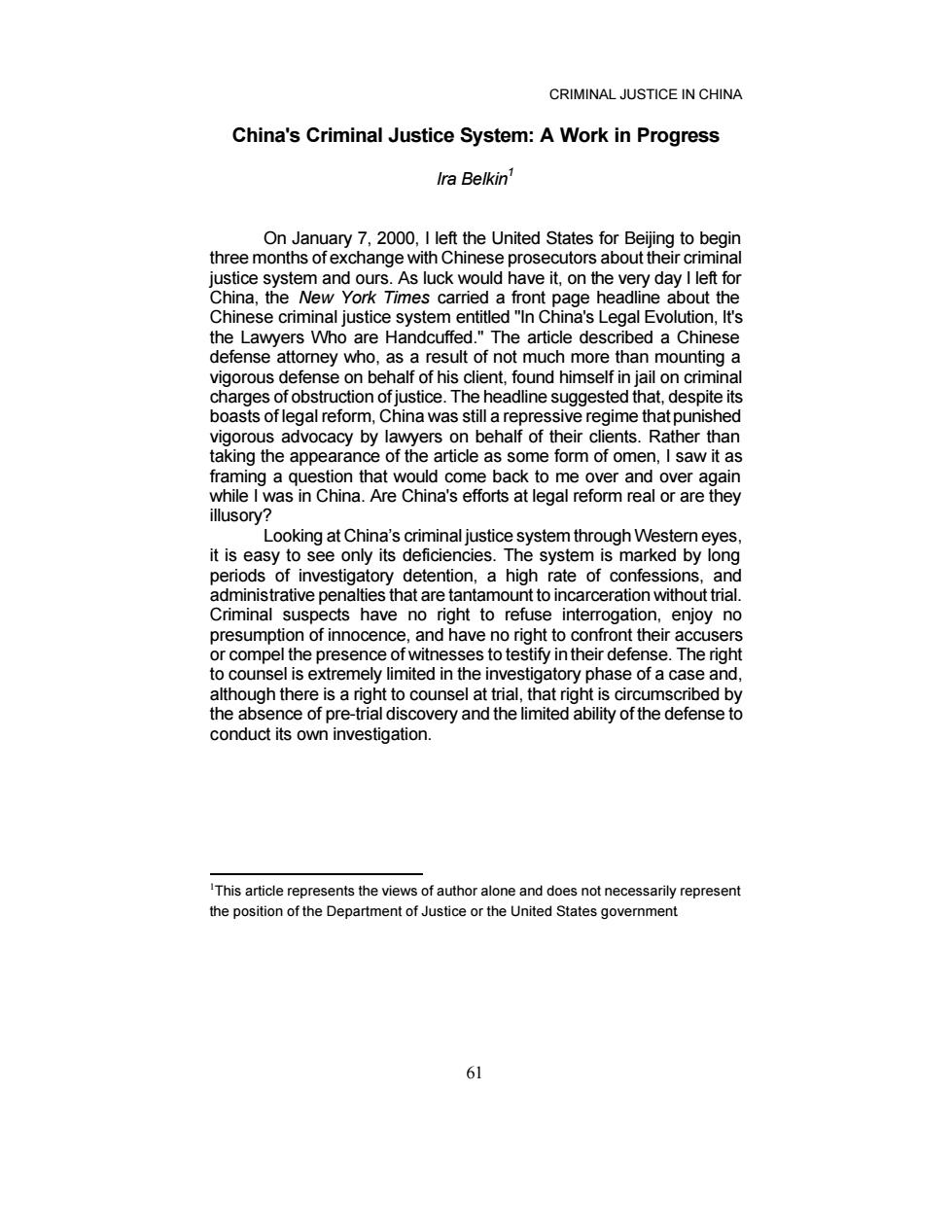
CRIMINAL JUSTICE IN CHINA China's Criminal Justice System:A Work in Progress Ira Belkin On January 7,2000,I left the United States for Beijing to begin three months of exchange with Chinese prosecutors about their criminal justice system and ours.As luck would have it,on the very day I left for China,the New York Times carried a front page headline about the Chinese criminal justice system entitled"In China's Legal Evolution,It's the Lawyers Who are Handcuffed."The article described a Chinese defense attorney who,as a result of not much more than mounting a vigorous defense on behalf of his client,found himself in jail on criminal charges of obstruction of justice.The headline suggested that,despite its boasts of legal reform,China was still a repressive regime that punished vigorous advocacy by lawyers on behalf of their clients.Rather than taking the appearance of the article as some form of omen,I saw it as framing a question that would come back to me over and over again while I was in China.Are China's efforts at legal reform real or are they illusory? Looking at China's criminal justice system through Western eyes, it is easy to see only its deficiencies.The system is marked by long periods of investigatory detention,a high rate of confessions,and administrative penalties that are tantamount to incarceration without trial. Criminal suspects have no right to refuse interrogation,enjoy no presumption of innocence,and have no right to confront their accusers or compel the presence of witnesses to testify in their defense.The right to counsel is extremely limited in the investigatory phase of a case and, although there is a right to counsel at trial,that right is circumscribed by the absence of pre-trial discovery and the limited ability of the defense to conduct its own investigation. IThis article represents the views of author alone and does not necessarily represent the position of the Department of Justice or the United States government
CRIMINAL JUSTICE IN CHINA 61 China's Criminal Justice System: A Work in Progress Ira Belkin1 On January 7, 2000, I left the United States for Beijing to begin three months of exchange with Chinese prosecutors about their criminal justice system and ours. As luck would have it, on the very day I left for China, the New York Times carried a front page headline about the Chinese criminal justice system entitled "In China's Legal Evolution, It's the Lawyers Who are Handcuffed." The article described a Chinese defense attorney who, as a result of not much more than mounting a vigorous defense on behalf of his client, found himself in jail on criminal charges of obstruction of justice. The headline suggested that, despite its boasts of legal reform, China was still a repressive regime that punished vigorous advocacy by lawyers on behalf of their clients. Rather than taking the appearance of the article as some form of omen, I saw it as framing a question that would come back to me over and over again while I was in China. Are China's efforts at legal reform real or are they illusory? Looking at China’s criminal justice system through Western eyes, it is easy to see only its deficiencies. The system is marked by long periods of investigatory detention, a high rate of confessions, and administrative penalties that are tantamount to incarceration without trial. Criminal suspects have no right to refuse interrogation, enjoy no presumption of innocence, and have no right to confront their accusers or compel the presence of witnesses to testify in their defense. The right to counsel is extremely limited in the investigatory phase of a case and, although there is a right to counsel at trial, that right is circumscribed by the absence of pre-trial discovery and the limited ability of the defense to conduct its own investigation. 1This article represents the views of author alone and does not necessarily represent the position of the Department of Justice or the United States government
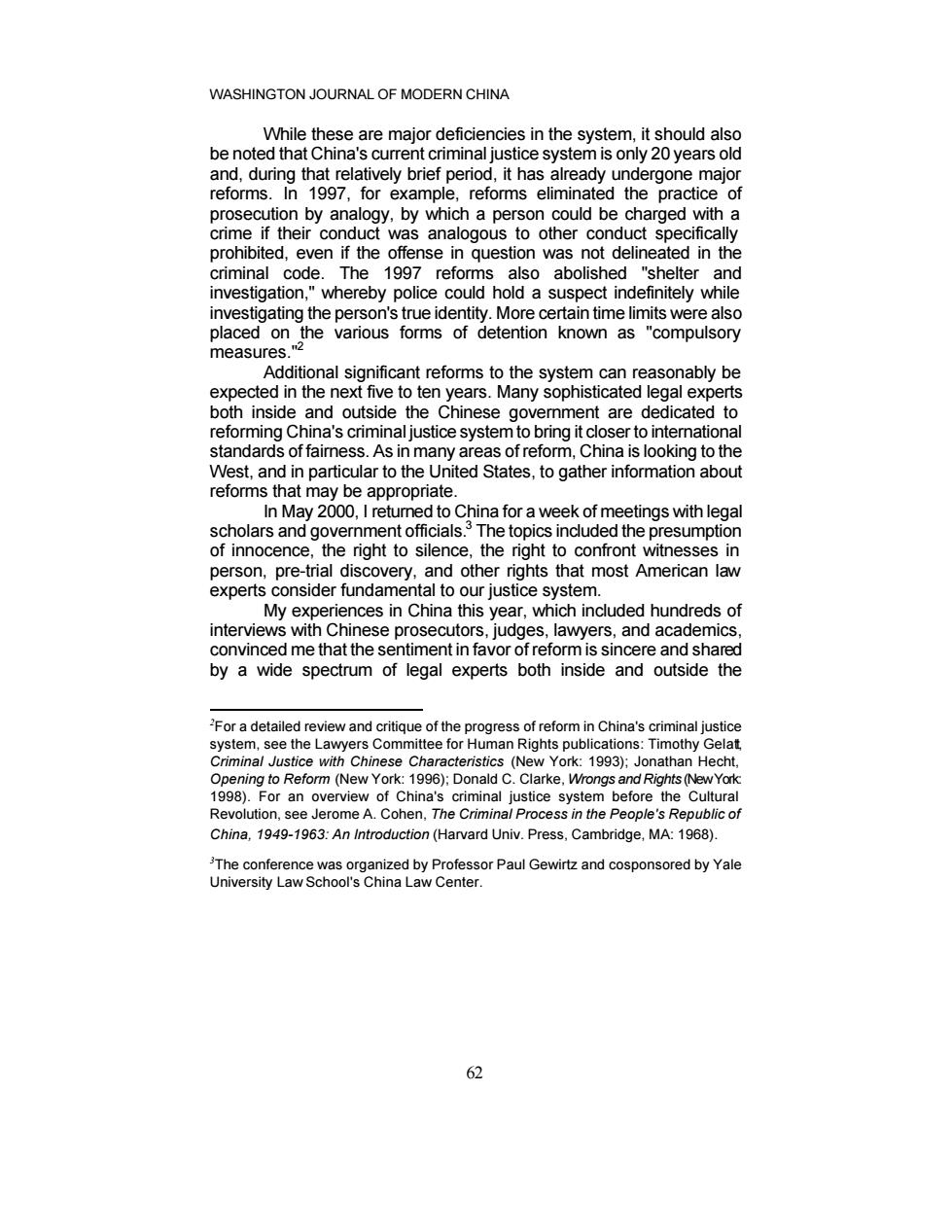
WASHINGTON JOURNAL OF MODERN CHINA While these are major deficiencies in the system,it should also be noted that China's current criminal justice system is only 20 years old and,during that relatively brief period,it has already undergone major reforms.In 1997,for example,reforms eliminated the practice of prosecution by analogy,by which a person could be charged with a crime if their conduct was analogous to other conduct specifically prohibited,even if the offense in question was not delineated in the criminal code.The 1997 reforms also abolished "shelter and investigation,"whereby police could hold a suspect indefinitely while investigating the person's true identity.More certain time limits were also placed on the various forms of detention known as "compulsory measures."2 Additional significant reforms to the system can reasonably be expected in the next five to ten years.Many sophisticated legal experts both inside and outside the Chinese government are dedicated to reforming China's criminal justice system to bring it closer to international standards of fairness.As in many areas of reform,China is looking to the West,and in particular to the United States,to gather information about reforms that may be appropriate. In May 2000,I retumed to China for a week of meetings with legal scholars and government officials.The topics included the presumption of innocence,the right to silence,the right to confront witnesses in person,pre-trial discovery,and other rights that most American law experts consider fundamental to our justice system. My experiences in China this year,which included hundreds of interviews with Chinese prosecutors,judges,lawyers,and academics, convinced me that the sentiment in favor of reform is sincere and shared by a wide spectrum of legal experts both inside and outside the PFor a detailed review and critique of the progress of reform in China's criminal justice system,see the Lawyers Committee for Human Rights publications:Timothy Gelat Criminal Justice with Chinese Characteristics (New York:1993);Jonathan Hecht. Opening to Reform (New York:1996):Donald C.Clarke,Wrongs and Rights(New York 1998).For an overview of China's criminal justice system before the Cultural Revolution,see Jerome A.Cohen,The Criminal Process in the People's Republic of China,1949-1963:An Introduction(Harvard Univ.Press,Cambridge,MA:1968). 3The conference was organized by Professor Paul Gewirtz and cosponsored by Yale University Law School's China Law Center. 62
WASHINGTON JOURNAL OF MODERN CHINA 62 While these are major deficiencies in the system, it should also be noted that China's current criminal justice system is only 20 years old and, during that relatively brief period, it has already undergone major reforms. In 1997, for example, reforms eliminated the practice of prosecution by analogy, by which a person could be charged with a crime if their conduct was analogous to other conduct specifically prohibited, even if the offense in question was not delineated in the criminal code. The 1997 reforms also abolished "shelter and investigation," whereby police could hold a suspect indefinitely while investigating the person's true identity. More certain time limits were also placed on the various forms of detention known as "compulsory measures."2 Additional significant reforms to the system can reasonably be expected in the next five to ten years. Many sophisticated legal experts both inside and outside the Chinese government are dedicated to reforming China's criminal justice system to bring it closer to international standards of fairness. As in many areas of reform, China is looking to the West, and in particular to the United States, to gather information about reforms that may be appropriate. In May 2000, I returned to China for a week of meetings with legal scholars and government officials.3 The topics included the presumption of innocence, the right to silence, the right to confront witnesses in person, pre-trial discovery, and other rights that most American law experts consider fundamental to our justice system. My experiences in China this year, which included hundreds of interviews with Chinese prosecutors, judges, lawyers, and academics, convinced me that the sentiment in favor of reform is sincere and shared by a wide spectrum of legal experts both inside and outside the 2For a detailed review and critique of the progress of reform in China's criminal justice system, see the Lawyers Committee for Human Rights publications: Timothy Gelatt, Criminal Justice with Chinese Characteristics (New York: 1993); Jonathan Hecht, Opening to Reform (New York: 1996); Donald C. Clarke, Wrongs and Rights (New York: 1998). For an overview of China's criminal justice system before the Cultural Revolution, see Jerome A. Cohen, The Criminal Process in the People's Republic of China, 1949-1963: An Introduction (Harvard Univ. Press, Cambridge, MA: 1968). 3The conference was organized by Professor Paul Gewirtz and cosponsored by Yale University Law School's China Law Center
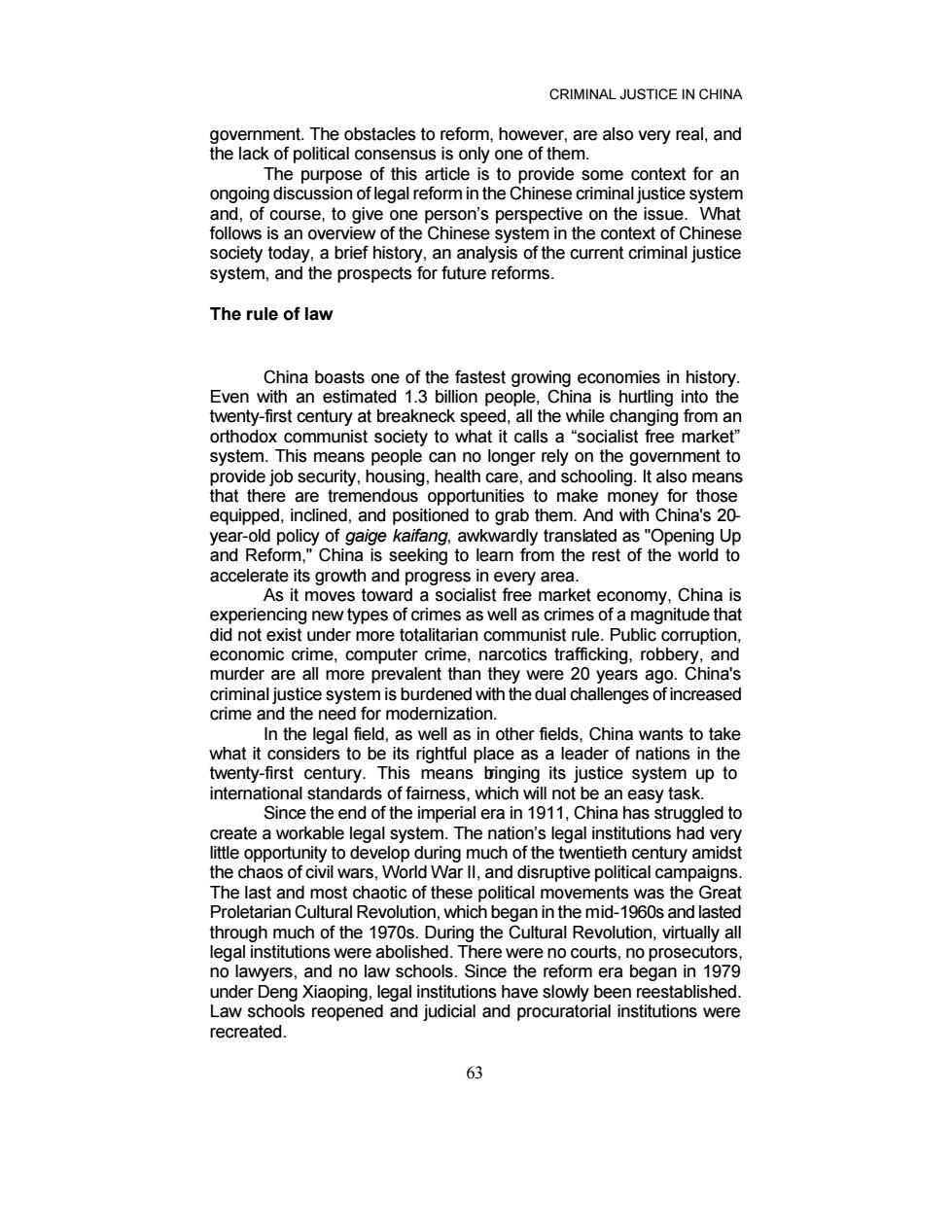
CRIMINAL JUSTICE IN CHINA government.The obstacles to reform,however,are also very real,and the lack of political consensus is only one of them. The purpose of this article is to provide some context for an ongoing discussion of legal reform in the Chinese criminal justice system and,of course,to give one person's perspective on the issue.What follows is an overview of the Chinese system in the context of Chinese society today,a brief history,an analysis of the current criminal justice system,and the prospects for future reforms The rule of law China boasts one of the fastest growing economies in history. Even with an estimated 1.3 billion people,China is hurtling into the twenty-first century at breakneck speed,all the while changing from an orthodox communist society to what it calls a "socialist free market" system.This means people can no longer rely on the govemnment to provide job security,housing,health care,and schooling.It also means that there are tremendous opportunities to make money for those equipped,inclined,and positioned to grab them.And with China's 20 year-old policy of gaige kaifang,awkwardly translated as"Opening Up and Reform,"China is seeking to learn from the rest of the world to accelerate its growth and progress in every area. As it moves toward a socialist free market economy,China is experiencing new types of crimes as well as crimes of a magnitude that did not exist under more totalitarian communist rule.Public corruption, economic crime,computer crime,narcotics trafficking,robbery,and murder are all more prevalent than they were 20 years ago.China's criminal justice system is burdened with the dual challenges of increased crime and the need for modernization. In the legal field,as well as in other fields,China wants to take what it considers to be its rightful place as a leader of nations in the twenty-first century.This means binging its justice system up to international standards of fairness,which will not be an easy task. Since the end of the imperial era in 1911,China has struggled to create a workable legal system.The nation's legal institutions had very little opportunity to develop during much of the twentieth century amidst the chaos of civil wars,World War ll,and disruptive political campaigns. The last and most chaotic of these political movements was the Great Proletarian Cultural Revolution,which began in the mid-1960s and lasted through much of the 1970s.During the Cultural Revolution,virtually all legal institutions were abolished.There were no courts,no prosecutors, no lawyers,and no law schools.Since the reform era began in 1979 under Deng Xiaoping,legal institutions have slowly been reestablished. Law schools reopened and judicial and procuratorial institutions were recreated. 63
CRIMINAL JUSTICE IN CHINA 63 government. The obstacles to reform, however, are also very real, and the lack of political consensus is only one of them. The purpose of this article is to provide some context for an ongoing discussion of legal reform in the Chinese criminal justice system and, of course, to give one person’s perspective on the issue. What follows is an overview of the Chinese system in the context of Chinese society today, a brief history, an analysis of the current criminal justice system, and the prospects for future reforms. The rule of law China boasts one of the fastest growing economies in history. Even with an estimated 1.3 billion people, China is hurtling into the twenty-first century at breakneck speed, all the while changing from an orthodox communist society to what it calls a “socialist free market” system. This means people can no longer rely on the government to provide job security, housing, health care, and schooling. It also means that there are tremendous opportunities to make money for those equipped, inclined, and positioned to grab them. And with China's 20- year-old policy of gaige kaifang, awkwardly translated as "Opening Up and Reform," China is seeking to learn from the rest of the world to accelerate its growth and progress in every area. As it moves toward a socialist free market economy, China is experiencing new types of crimes as well as crimes of a magnitude that did not exist under more totalitarian communist rule. Public corruption, economic crime, computer crime, narcotics trafficking, robbery, and murder are all more prevalent than they were 20 years ago. China's criminal justice system is burdened with the dual challenges of increased crime and the need for modernization. In the legal field, as well as in other fields, China wants to take what it considers to be its rightful place as a leader of nations in the twenty-first century. This means bringing its justice system up to international standards of fairness, which will not be an easy task. Since the end of the imperial era in 1911, China has struggled to create a workable legal system. The nation’s legal institutions had very little opportunity to develop during much of the twentieth century amidst the chaos of civil wars, World War II, and disruptive political campaigns. The last and most chaotic of these political movements was the Great Proletarian Cultural Revolution, which began in the mid-1960s and lasted through much of the 1970s. During the Cultural Revolution, virtually all legal institutions were abolished. There were no courts, no prosecutors, no lawyers, and no law schools. Since the reform era began in 1979 under Deng Xiaoping, legal institutions have slowly been reestablished. Law schools reopened and judicial and procuratorial institutions were recreated
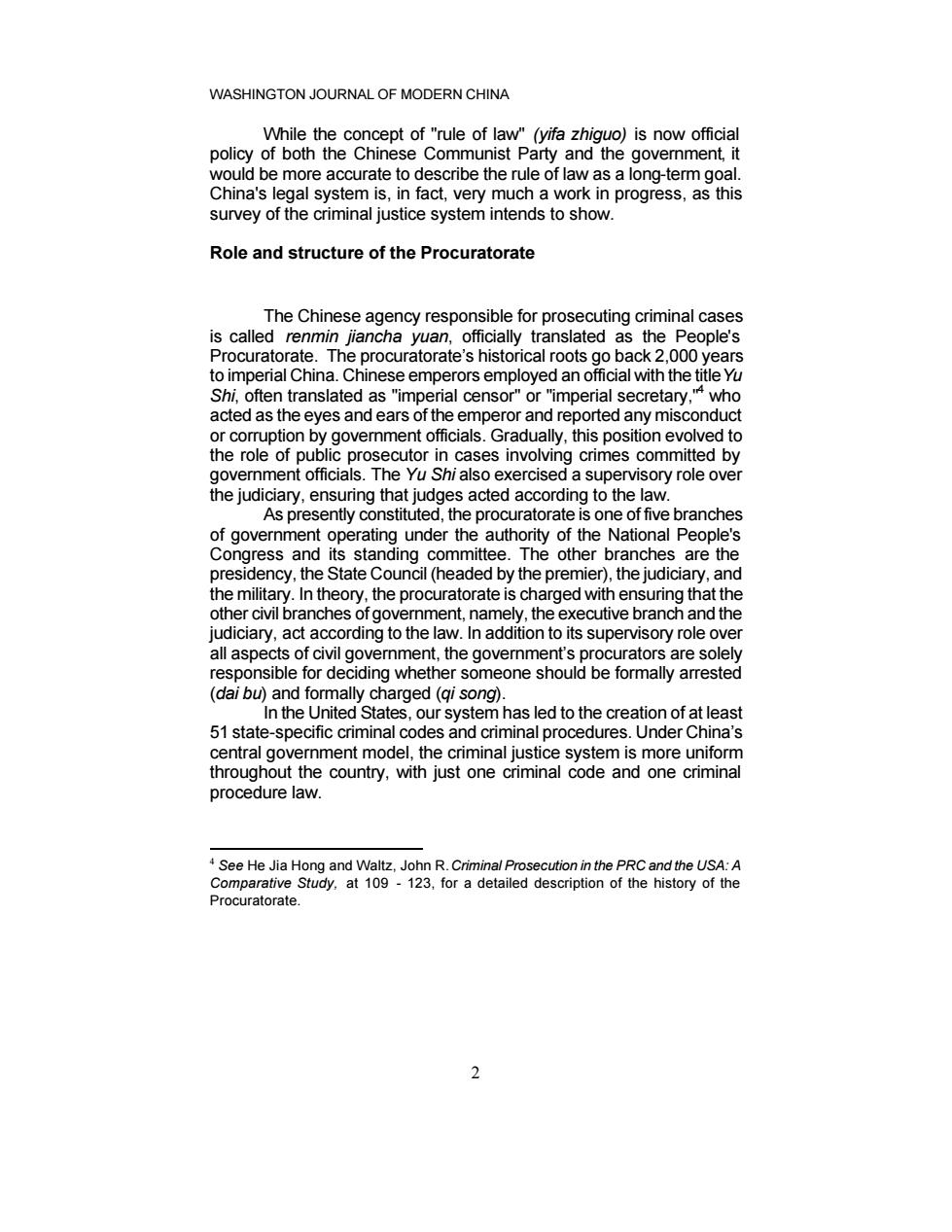
WASHINGTON JOURNAL OF MODERN CHINA While the concept of "rule of law"(yifa zhiguo)is now official policy of both the Chinese Communist Party and the government,it would be more accurate to describe the rule of law as a long-term goal. China's legal system is,in fact,very much a work in progress,as this survey of the criminal justice system intends to show. Role and structure of the Procuratorate The Chinese agency responsible for prosecuting criminal cases is called renmin jiancha yuan,officially translated as the People's Procuratorate.The procuratorate's historical roots go back 2,000 years to imperial China.Chinese emperors employed an official with the title Yu Shi,often translated as "imperial censor"or "imperial secretary,"who acted as the eyes and ears of the emperor and reported any misconduct or corruption by government officials.Gradually,this position evolved to the role of public prosecutor in cases involving crimes committed by government officials.The Yu Shi also exercised a supervisory role over the judiciary,ensuring that judges acted according to the law. As presently constituted,the procuratorate is one of five branches of government operating under the authority of the National People's Congress and its standing committee.The other branches are the presidency,the State Council(headed by the premier),the judiciary,and the military.In theory,the procuratorate is charged with ensuring that the other civil branches of government,namely,the executive branch and the judiciary,act according to the law.In addition to its supervisory role over all aspects of civil government,the government's procurators are solely responsible for deciding whether someone should be formally arrested (dai bu)and formally charged (gi song). In the United States,our system has led to the creation of at least 51 state-specific criminal codes and criminal procedures.Under China's central government model,the criminal justice system is more uniform throughout the country,with just one criminal code and one criminal procedure law. See He Jia Hong and Waltz,John R.Criminal Prosecution in the PRC and the USA:A Comparative Study,at 109 -123,for a detailed description of the history of the Procuratorate. 2
WASHINGTON JOURNAL OF MODERN CHINA 2 While the concept of "rule of law" (yifa zhiguo) is now official policy of both the Chinese Communist Party and the government, it would be more accurate to describe the rule of law as a long-term goal. China's legal system is, in fact, very much a work in progress, as this survey of the criminal justice system intends to show. Role and structure of the Procuratorate The Chinese agency responsible for prosecuting criminal cases is called renmin jiancha yuan, officially translated as the People's Procuratorate. The procuratorate’s historical roots go back 2,000 years to imperial China. Chinese emperors employed an official with the title Yu Shi, often translated as "imperial censor" or "imperial secretary,"4 who acted as the eyes and ears of the emperor and reported any misconduct or corruption by government officials. Gradually, this position evolved to the role of public prosecutor in cases involving crimes committed by government officials. The Yu Shi also exercised a supervisory role over the judiciary, ensuring that judges acted according to the law. As presently constituted, the procuratorate is one of five branches of government operating under the authority of the National People's Congress and its standing committee. The other branches are the presidency, the State Council (headed by the premier), the judiciary, and the military. In theory, the procuratorate is charged with ensuring that the other civil branches of government, namely, the executive branch and the judiciary, act according to the law. In addition to its supervisory role over all aspects of civil government, the government’s procurators are solely responsible for deciding whether someone should be formally arrested (dai bu) and formally charged (qi song). In the United States, our system has led to the creation of at least 51 state-specific criminal codes and criminal procedures. Under China’s central government model, the criminal justice system is more uniform throughout the country, with just one criminal code and one criminal procedure law. 4 See He Jia Hong and Waltz, John R. Criminal Prosecution in the PRC and the USA: A Comparative Study, at 109 - 123, for a detailed description of the history of the Procuratorate
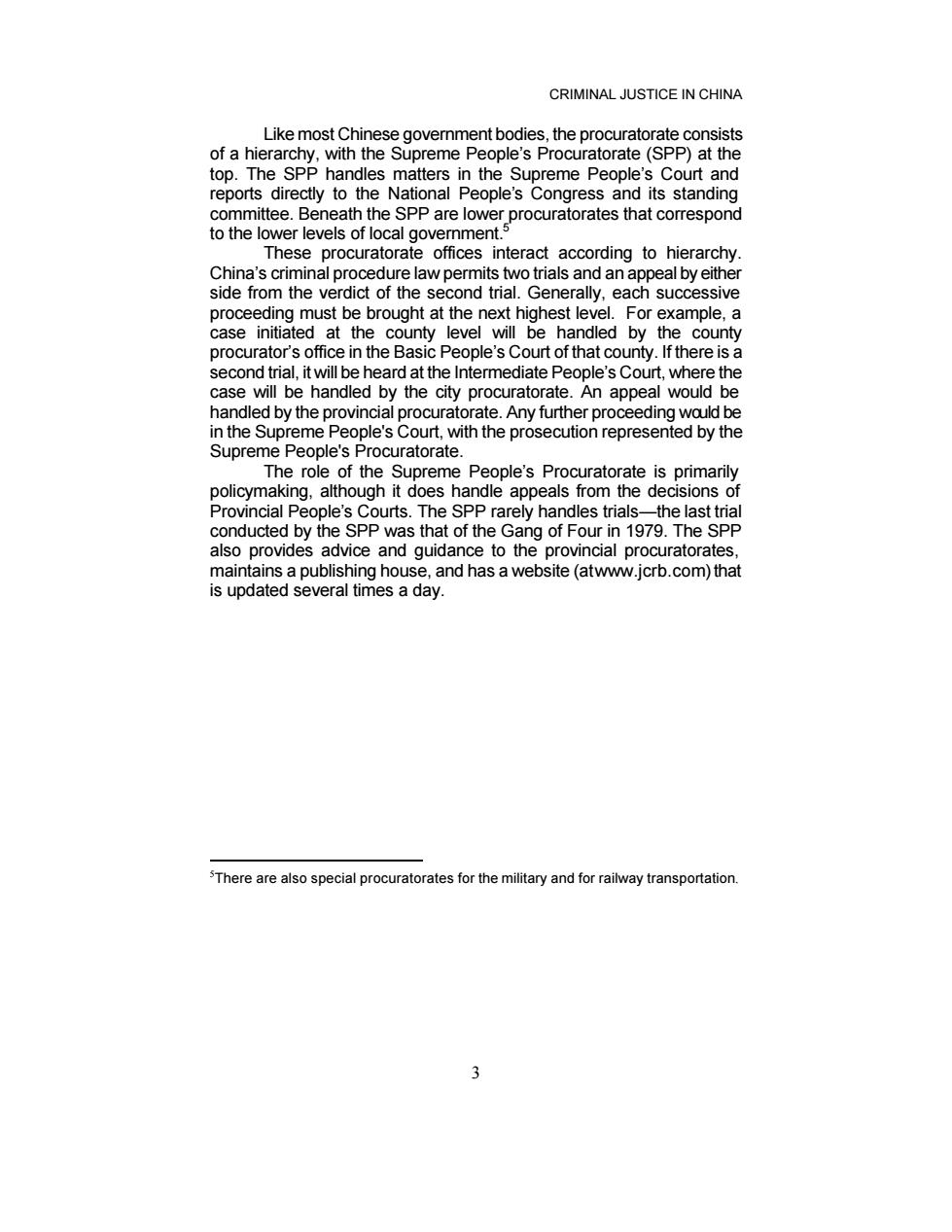
CRIMINAL JUSTICE IN CHINA Like most Chinese government bodies,the procuratorate consists of a hierarchy,with the Supreme People's Procuratorate(SPP)at the top.The SPP handles matters in the Supreme People's Court and reports directly to the National People's Congress and its standing committee.Beneath the SPP are lower procuratorates that correspond to the lower levels of local government.5 These procuratorate offices interact according to hierarchy. China's criminal procedure law permits two trials and an appeal by either side from the verdict of the second trial.Generally,each successive proceeding must be brought at the next highest level.For example,a case initiated at the county level will be handled by the county procurator's office in the Basic People's Court of that county.If there is a second trial,it will be heard at the Intermediate People's Court,where the case will be handled by the city procuratorate.An appeal would be handled by the provincial procuratorate.Any further proceeding would be in the Supreme People's Court,with the prosecution represented by the Supreme People's Procuratorate. The role of the Supreme People's Procuratorate is primarily policymaking,although it does handle appeals from the decisions of Provincial People's Courts.The SPP rarely handles trials-the last trial conducted by the SPP was that of the Gang of Four in 1979.The SPP also provides advice and guidance to the provincial procuratorates, maintains a publishing house,and has a website(atwww.jcrb.com)that is updated several times a day. SThere are also special procuratorates for the military and for railway transportation. 3
CRIMINAL JUSTICE IN CHINA 3 Like most Chinese government bodies, the procuratorate consists of a hierarchy, with the Supreme People’s Procuratorate (SPP) at the top. The SPP handles matters in the Supreme People’s Court and reports directly to the National People’s Congress and its standing committee. Beneath the SPP are lower procuratorates that correspond to the lower levels of local government.5 5There are also special procuratorates for the military and for railway transportation. These procuratorate offices interact according to hierarchy. China’s criminal procedure law permits two trials and an appeal by either side from the verdict of the second trial. Generally, each successive proceeding must be brought at the next highest level. For example, a case initiated at the county level will be handled by the county procurator’s office in the Basic People’s Court of that county. If there is a second trial, it will be heard at the Intermediate People’s Court, where the case will be handled by the city procuratorate. An appeal would be handled by the provincial procuratorate. Any further proceeding would be in the Supreme People's Court, with the prosecution represented by the Supreme People's Procuratorate. The role of the Supreme People’s Procuratorate is primarily policymaking, although it does handle appeals from the decisions of Provincial People’s Courts. The SPP rarely handles trials—the last trial conducted by the SPP was that of the Gang of Four in 1979. The SPP also provides advice and guidance to the provincial procuratorates, maintains a publishing house, and has a website (at www.jcrb.com)that is updated several times a day
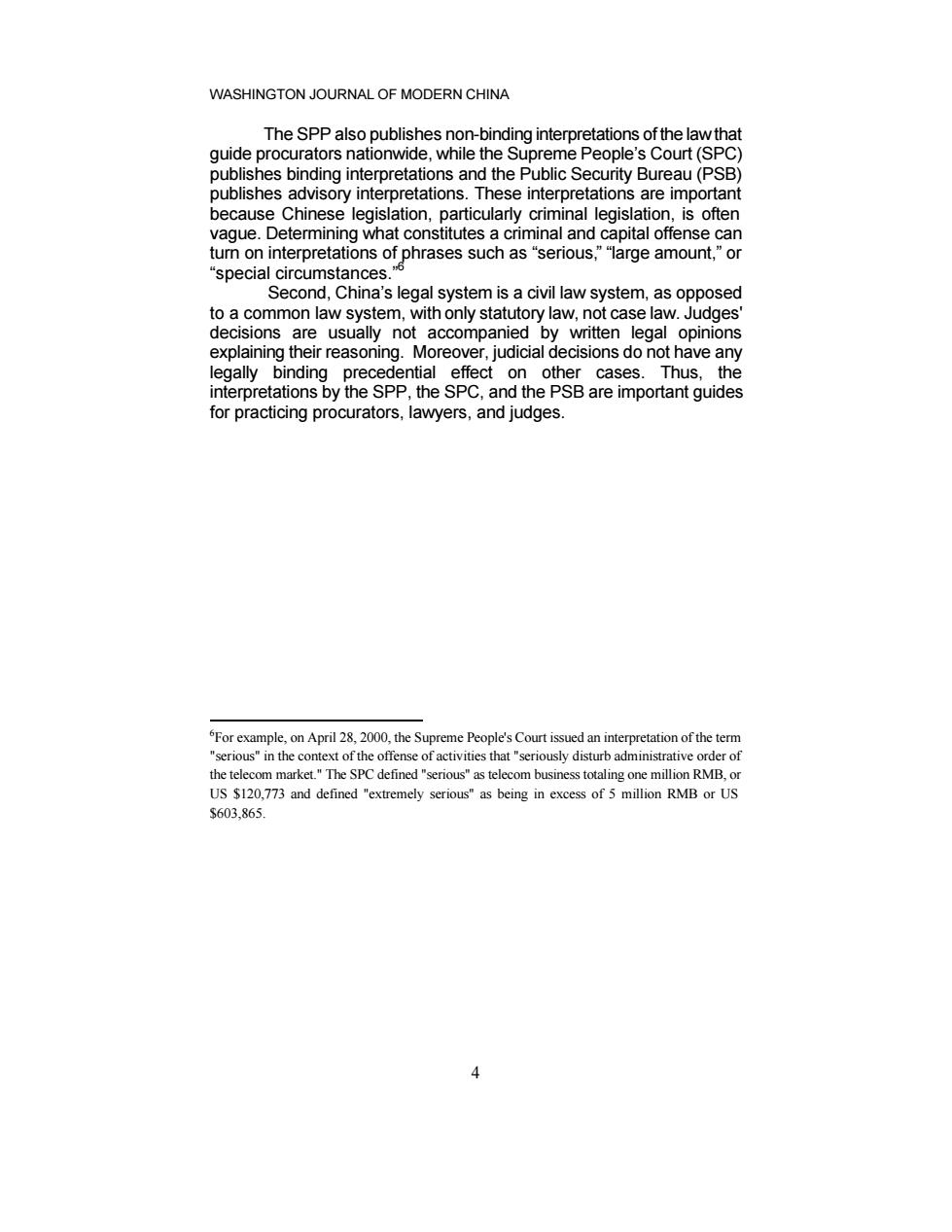
WASHINGTON JOURNAL OF MODERN CHINA The SPP also publishes non-binding interpretations of the law that guide procurators nationwide,while the Supreme People's Court(SPC) publishes binding interpretations and the Public Security Bureau(PSB) publishes advisory interpretations.These interpretations are important because Chinese legislation,particularly criminal legislation,is often vague.Determining what constitutes a criminal and capital offense can turn on interpretations of phrases such as"serious,""large amount,"or special circumstances."6 Second,China's legal system is a civil law system,as opposed to a common law system,with only statutory law,not case law.Judges decisions are usually not accompanied by written legal opinions explaining their reasoning.Moreover,judicial decisions do not have any legally binding precedential effect on other cases.Thus,the interpretations by the SPP,the SPC,and the PSB are important guides for practicing procurators,lawyers,and judges. For example,on April 28,2000,the Supreme People's Court issued an interpretation of the term "serious"in the context of the offense of activities that "seriously disturb administrative order of the telecom market."The SPC defined "serious"as telecom business totaling one million RMB,or US $120,773 and defined "extremely serious"as being in excess of 5 million RMB or US $603,865. 4
WASHINGTON JOURNAL OF MODERN CHINA 4 The SPP also publishes non-binding interpretations of the law that guide procurators nationwide, while the Supreme People’s Court (SPC) publishes binding interpretations and the Public Security Bureau (PSB) publishes advisory interpretations. These interpretations are important because Chinese legislation, particularly criminal legislation, is often vague. Determining what constitutes a criminal and capital offense can turn on interpretations of phrases such as “serious,” “large amount,” or “special circumstances.”6 Second, China’s legal system is a civil law system, as opposed to a common law system, with only statutory law, not case law. Judges' decisions are usually not accompanied by written legal opinions explaining their reasoning. Moreover, judicial decisions do not have any legally binding precedential effect on other cases. Thus, the interpretations by the SPP, the SPC, and the PSB are important guides for practicing procurators, lawyers, and judges. 6For example, on April 28, 2000, the Supreme People's Court issued an interpretation of the term "serious" in the context of the offense of activities that "seriously disturb administrative order of the telecom market." The SPC defined "serious" as telecom business totaling one million RMB, or US $120,773 and defined "extremely serious" as being in excess of 5 million RMB or US $603,865
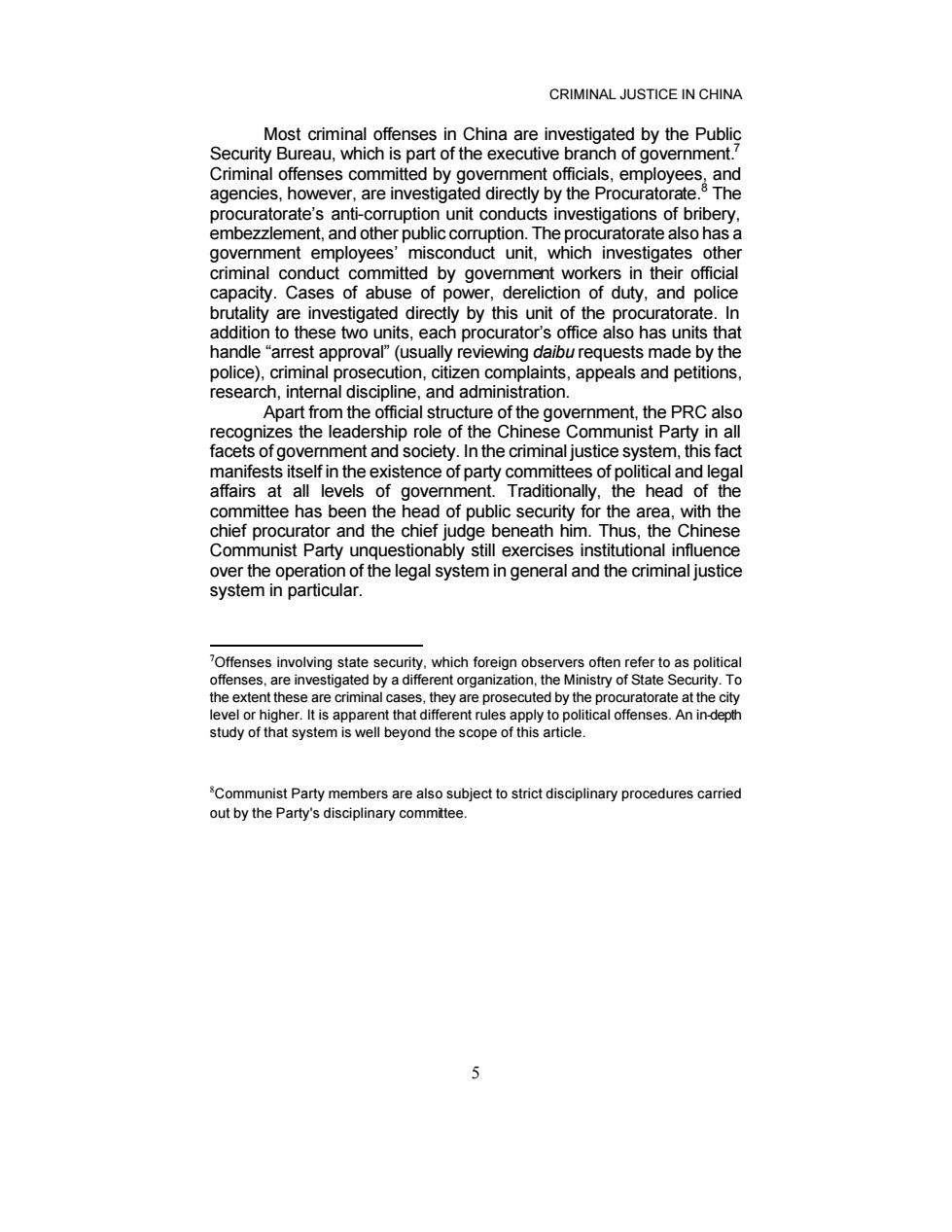
CRIMINAL JUSTICE IN CHINA Most criminal offenses in China are investigated by the Public Security Bureau,which is part of the executive branch of government.' Criminal offenses committed by government officials,employees,and agencies,however,are investigated directly by the Procuratorate.The procuratorate's anti-corruption unit conducts investigations of bribery, embezzlement,and other public corruption.The procuratorate also has a government employees'misconduct unit,which investigates other criminal conduct committed by government workers in their official capacity.Cases of abuse of power,dereliction of duty,and police brutality are investigated directly by this unit of the procuratorate.In addition to these two units,each procurator's office also has units that handle"arrest approval"(usually reviewing daibu requests made by the police),criminal prosecution,citizen complaints,appeals and petitions, research,internal discipline,and administration. Apart from the official structure of the government,the PRC also recognizes the leadership role of the Chinese Communist Party in all facets of government and society.In the criminal justice system,this fact manifests itself in the existence of party committees of political and legal affairs at all levels of government.Traditionally,the head of the committee has been the head of public security for the area,with the chief procurator and the chief judge beneath him.Thus,the Chinese Communist Party unquestionably still exercises institutional influence over the operation of the legal system in general and the criminal justice system in particular. "Offenses involving state security,which foreign observers often refer to as political offenses,are investigated by a different organization,the Ministry of State Security.To the extent these are criminal cases,they are prosecuted by the procuratorate at the city level or higher.It is apparent that different rules apply to political offenses.An in-depth study of that system is well beyond the scope of this article. Communist Party members are also subject to strict disciplinary procedures carried out by the Party's disciplinary committee 5
CRIMINAL JUSTICE IN CHINA 5 Most criminal offenses in China are investigated by the Public Security Bureau, which is part of the executive branch of government.7 Criminal offenses committed by government officials, employees, and agencies, however, are investigated directly by the Procuratorate.8 The procuratorate’s anti-corruption unit conducts investigations of bribery, embezzlement, and other public corruption. The procuratorate also has a government employees’ misconduct unit, which investigates other criminal conduct committed by government workers in their official capacity. Cases of abuse of power, dereliction of duty, and police brutality are investigated directly by this unit of the procuratorate. In addition to these two units, each procurator’s office also has units that handle “arrest approval” (usually reviewing daibu requests made by the police), criminal prosecution, citizen complaints, appeals and petitions, research, internal discipline, and administration. Apart from the official structure of the government, the PRC also recognizes the leadership role of the Chinese Communist Party in all facets of government and society. In the criminal justice system, this fact manifests itself in the existence of party committees of political and legal affairs at all levels of government. Traditionally, the head of the committee has been the head of public security for the area, with the chief procurator and the chief judge beneath him. Thus, the Chinese Communist Party unquestionably still exercises institutional influence over the operation of the legal system in general and the criminal justice system in particular. 7Offenses involving state security, which foreign observers often refer to as political offenses, are investigated by a different organization, the Ministry of State Security. To the extent these are criminal cases, they are prosecuted by the procuratorate at the city level or higher. It is apparent that different rules apply to political offenses. An in-depth study of that system is well beyond the scope of this article. 8Communist Party members are also subject to strict disciplinary procedures carried out by the Party's disciplinary committee
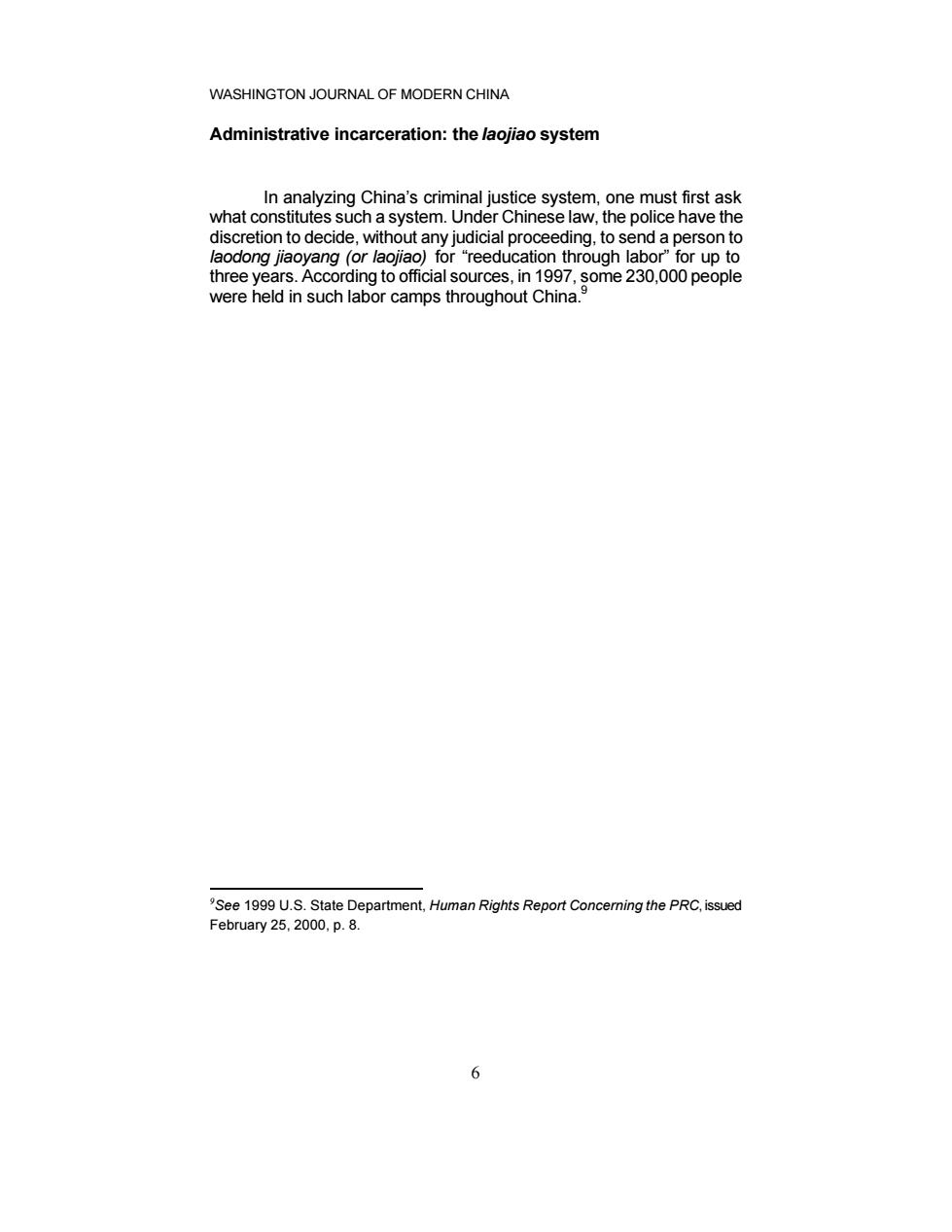
WASHINGTON JOURNAL OF MODERN CHINA Administrative incarceration:the laojiao system In analyzing China's criminal justice system,one must first ask what constitutes such a system.Under Chinese law,the police have the discretion to decide,without any judicial proceeding,to send a person to laodong jiaoyang(or laojiao)for "reeducation through labor"for up to three years.According to official sources,in 1997,some 230,000 people were held in such labor camps throughout China. See 1999 U.S.State Department,Human Rights Report Concerning the PRC,issued February 25,2000,p.8. 6
WASHINGTON JOURNAL OF MODERN CHINA 6 Administrative incarceration: the laojiao system In analyzing China’s criminal justice system, one must first ask what constitutes such a system. Under Chinese law, the police have the discretion to decide, without any judicial proceeding, to send a person to laodong jiaoyang (or laojiao) for “reeducation through labor” for up to three years. According to official sources, in 1997, some 230,000 people were held in such labor camps throughout China.9 9See 1999 U.S. State Department, Human Rights Report Concerning the PRC, issued February 25, 2000, p. 8
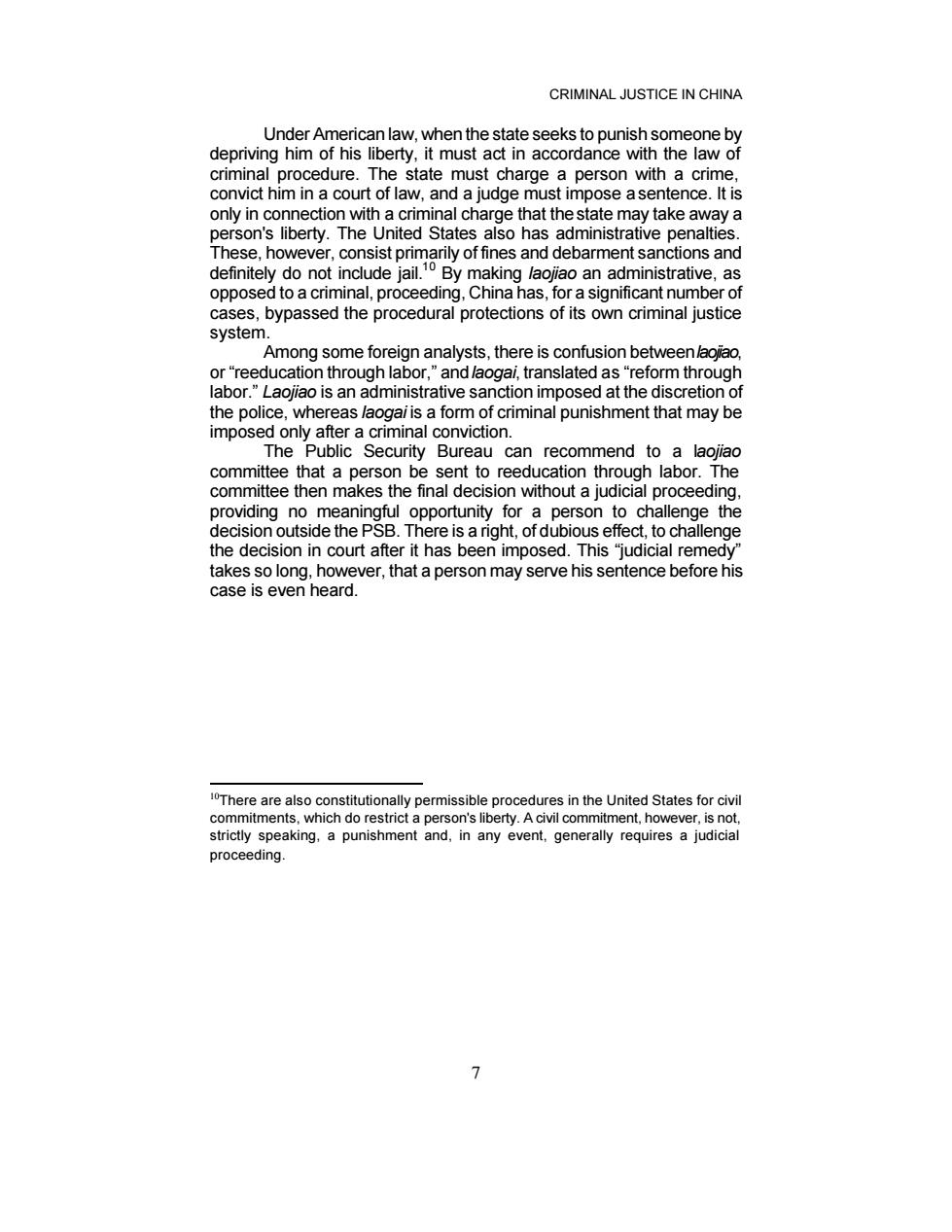
CRIMINAL JUSTICE IN CHINA Under American law,when the state seeks to punish someone by depriving him of his liberty,it must act in accordance with the law of criminal procedure.The state must charge a person with a crime, convict him in a court of law,and a judge must impose a sentence.It is only in connection with a criminal charge that the state may take away a person's liberty.The United States also has administrative penalties. These,however,consist primarily of fines and debarment sanctions and definitely do not include jail.By making laojiao an administrative,as opposed to a criminal,proceeding,China has,for a significant number of cases,bypassed the procedural protections of its own criminal justice system. Among some foreign analysts,there is confusion betweenlaoiao, or"reeducation through labor,"and /aogai,translated as"reform through labor."Laojiao is an administrative sanction imposed at the discretion of the police,whereas /aogai is a form of criminal punishment that may be imposed only after a criminal conviction. The Public Security Bureau can recommend to a laojiao committee that a person be sent to reeducation through labor.The committee then makes the final decision without a judicial proceeding, providing no meaningful opportunity for a person to challenge the decision outside the PSB.There is a right,of dubious effect,to challenge the decision in court after it has been imposed.This"judicial remedy" takes so long,however,that a person may serve his sentence before his case is even heard. 10There are also constitutionally permissible procedures in the United States for civil commitments,which do restrict a person's liberty.A civil commitment,however,is not. strictly speaking,a punishment and,in any event,generally requires a judicial proceeding. 个
CRIMINAL JUSTICE IN CHINA 7 Under American law, when the state seeks to punish someone by depriving him of his liberty, it must act in accordance with the law of criminal procedure. The state must charge a person with a crime, convict him in a court of law, and a judge must impose asentence. It is only in connection with a criminal charge that the state may take away a person's liberty. The United States also has administrative penalties. These, however, consist primarily of fines and debarment sanctions and definitely do not include jail.10 By making laojiao an administrative, as opposed to a criminal, proceeding, China has, for a significant number of cases, bypassed the procedural protections of its own criminal justice system. Among some foreign analysts, there is confusion between laojiao, or “reeducation through labor,” and laogai, translated as “reform through labor.” Laojiao is an administrative sanction imposed at the discretion of the police, whereas laogai is a form of criminal punishment that may be imposed only after a criminal conviction. The Public Security Bureau can recommend to a laojiao committee that a person be sent to reeducation through labor. The committee then makes the final decision without a judicial proceeding, providing no meaningful opportunity for a person to challenge the decision outside the PSB. There is a right, of dubious effect, to challenge the decision in court after it has been imposed. This “judicial remedy” takes so long, however, that a person may serve his sentence before his case is even heard. 10There are also constitutionally permissible procedures in the United States for civil commitments, which do restrict a person's liberty. A civil commitment, however, is not, strictly speaking, a punishment and, in any event, generally requires a judicial proceeding
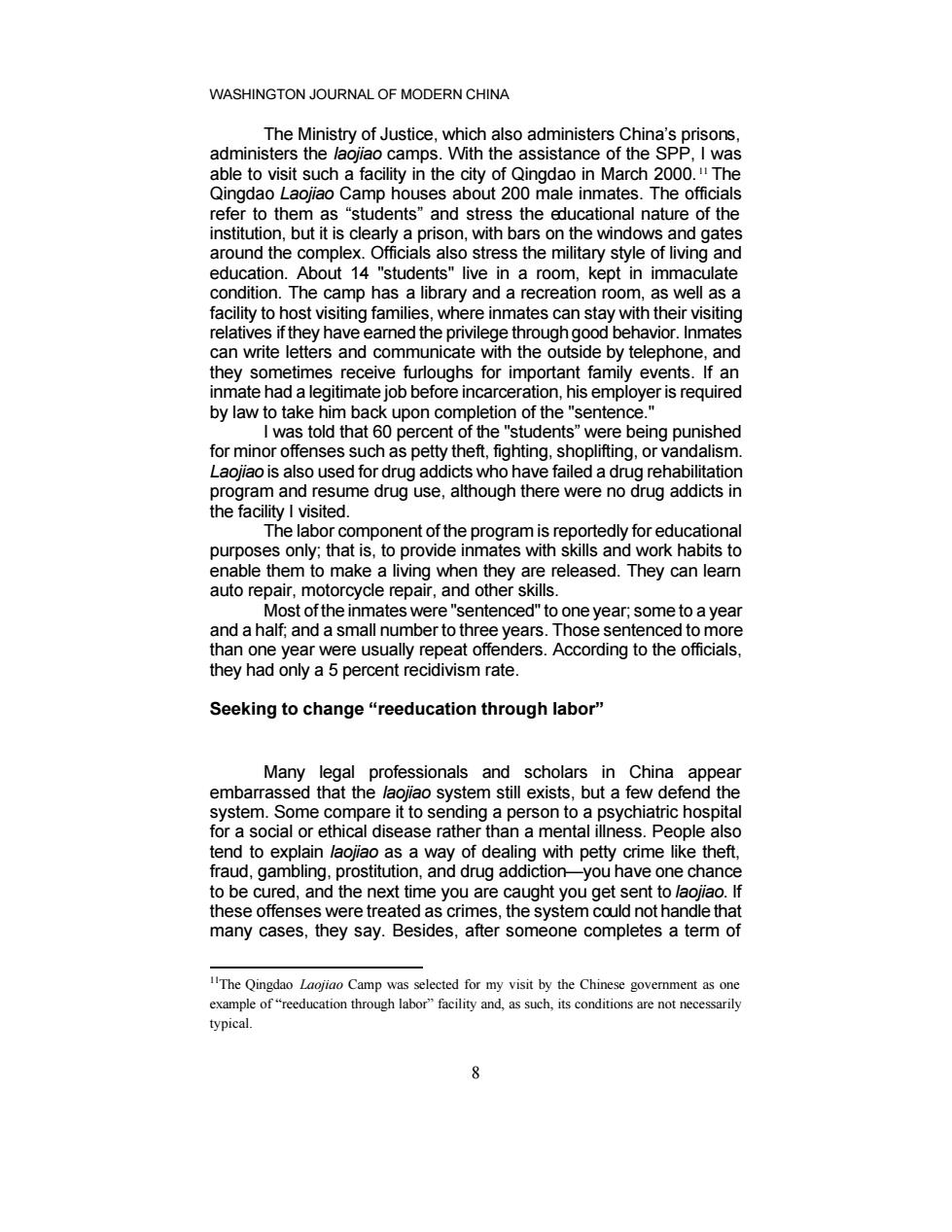
WASHINGTON JOURNAL OF MODERN CHINA The Ministry of Justice,which also administers China's prisons, administers the laojiao camps.With the assistance of the SPP,I was able to visit such a facility in the city of Qingdao in March 2000."The Qingdao Laojiao Camp houses about 200 male inmates.The officials refer to them as"students"and stress the educational nature of the institution,but it is clearly a prison,with bars on the windows and gates around the complex.Officials also stress the military style of living and education.About 14 "students"live in a room,kept in immaculate condition.The camp has a library and a recreation room,as well as a facility to host visiting families,where inmates can stay with their visiting relatives if they have earned the privilege through good behavior.Inmates can write letters and communicate with the outside by telephone,and they sometimes receive furloughs for important family events.If an inmate had a legitimate job before incarceration,his employer is required by law to take him back upon completion of the"sentence." I was told that 60 percent of the "students"were being punished for minor offenses such as petty theft,fighting,shoplifting,or vandalism. Laojiao is also used for drug addicts who have failed a drug rehabilitation program and resume drug use,although there were no drug addicts in the facility I visited. The labor component of the program is reportedly for educational purposes only;that is,to provide inmates with skills and work habits to enable them to make a living when they are released.They can learn auto repair,motorcycle repair,and other skills. Most of the inmates were"sentenced"to one year;some to a year and a half;and a small number to three years.Those sentenced to more than one year were usually repeat offenders.According to the officials, they had only a 5 percent recidivism rate. Seeking to change"reeducation through labor" Many legal professionals and scholars in China appear embarrassed that the laojiao system still exists,but a few defend the system.Some compare it to sending a person to a psychiatric hospital for a social or ethical disease rather than a mental illness.People also tend to explain laojiao as a way of dealing with petty crime like theft, fraud,gambling,prostitution,and drug addiction-you have one chance to be cured,and the next time you are caught you get sent to laojiao.If these offenses were treated as crimes,the system could not handle that many cases,they say.Besides,after someone completes a term of IThe Qingdao Laojiao Camp was selected for my visit by the Chinese goverment as one example of"reeducation through labor"facility and,as such,its conditions are not necessarily typical. 8
WASHINGTON JOURNAL OF MODERN CHINA 8 The Ministry of Justice, which also administers China’s prisons, administers the laojiao camps. With the assistance of the SPP, I was able to visit such a facility in the city of Qingdao in March 2000. 11 The Qingdao Laojiao Camp houses about 200 male inmates. The officials refer to them as “students” and stress the educational nature of the institution, but it is clearly a prison, with bars on the windows and gates around the complex. Officials also stress the military style of living and education. About 14 "students" live in a room, kept in immaculate condition. The camp has a library and a recreation room, as well as a facility to host visiting families, where inmates can stay with their visiting relatives if they have earned the privilege through good behavior. Inmates can write letters and communicate with the outside by telephone, and they sometimes receive furloughs for important family events. If an inmate had a legitimate job before incarceration, his employer is required by law to take him back upon completion of the "sentence." I was told that 60 percent of the "students” were being punished for minor offenses such as petty theft, fighting, shoplifting, or vandalism. Laojiao is also used for drug addicts who have failed a drug rehabilitation program and resume drug use, although there were no drug addicts in the facility I visited. The labor component of the program is reportedly for educational purposes only; that is, to provide inmates with skills and work habits to enable them to make a living when they are released. They can learn auto repair, motorcycle repair, and other skills. Most of the inmates were "sentenced" to one year; some to a year and a half; and a small number to three years. Those sentenced to more than one year were usually repeat offenders. According to the officials, they had only a 5 percent recidivism rate. Seeking to change “reeducation through labor” Many legal professionals and scholars in China appear embarrassed that the laojiao system still exists, but a few defend the system. Some compare it to sending a person to a psychiatric hospital for a social or ethical disease rather than a mental illness. People also tend to explain laojiao as a way of dealing with petty crime like theft, fraud, gambling, prostitution, and drug addiction—you have one chance to be cured, and the next time you are caught you get sent to laojiao. If these offenses were treated as crimes, the system could not handle that many cases, they say. Besides, after someone completes a term of 11The Qingdao Laojiao Camp was selected for my visit by the Chinese government as one example of “reeducation through labor” facility and, as such, its conditions are not necessarily typical